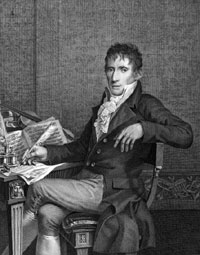|
Alessandro Antonio Francesco Maria Rolla was born on 23 April 1757, just fifteen months after the birth of Mozart. And yet he died in 1841, some fourteen years after the death of Beethoven (1827) and thirteen after the death of Schubert (1828) – when Berlioz was already thirty-eight, Chopin thirty-one and Liszt thirty, and when the most highly-regarded composers then living were Schumann and Mendelssohn. His career thus spanned virtually three quarters of a century and a number of significant changes in musical thought and practice.
Nonetheless, Rolla must be regarded as quintessentially ‘classical’ in his tastes and craftsmanship. This can surely be attributed to the provinciality of his own career. After receiving his earliest musical education in his home town of Pavia, the young Rolla went to nearby Milan where he studied violin with a certain Renzi (and, purportedly, with his coeval Giacomo Conti), and composition with Gian Andrea Fioroni. From 1782 to 1802 he was in the employ of Ferdinand I of Bourbon-Parma, Duke of Parma, first as principal viola, and later as principal violin in the Orchestra Reale. Then in 1802 he was appointed ‘Direttore e Capo d’Orchestra’ at the Teatro alla Scala, Milan, and, after the establishment of the Conservatorio in Milan in 1808, ‘Professore di Violino e Viola’ at that institution; he was to hold both titles until the early 1830s. It is true, therefore, that Rolla occupied various prestigious positions, but his musical activity – and in particular his compositional estro – was held in check by the relative insularity of his geographical domain and the fact that he rarely, if ever travelled further afield.
|

